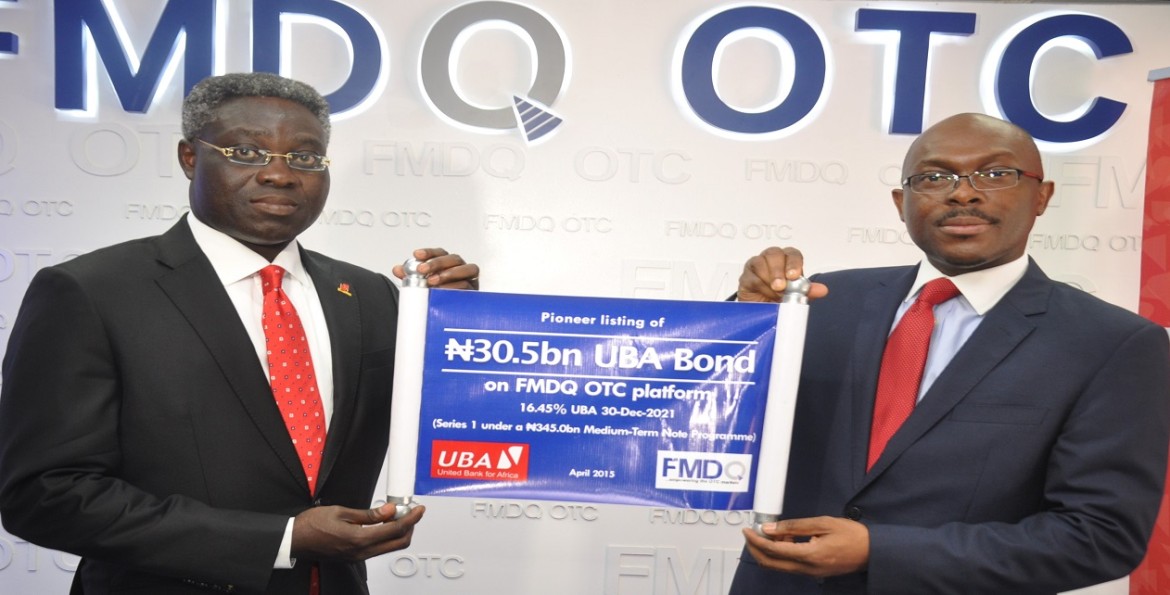- $1bn Eurobond Will Boost Corporate Bond Listings
The Federal Government’s recent listing of the $1bn Eurobond on FMDQ OTC Securities Exchange market will pave the way for domestic listing of Nigerian corporates’ Eurobonds and ignite the vision for an ‘afrodollar’ market, according to the FMDQ.
The Federal Government, through the Debt Management Office, had for the first time listed its Eurobond domestically after successfully raising $1bn from the international markets in February, and following a series of strategic engagements that spanned at least three years with the FMDQ and other stakeholders.
The event was graced by the Director-General of the DMO, Dr. Abraham Nwankwo, along with key representatives from the DMO.
The OTC Exchange also hosted the Securities and Exchange Commission; the adviser to the issuer and co-sponsor of the Eurobond on FMDQ, Stanbic IBTC Capital Limited; the arranger/dealer and co-sponsor of the issue on FMDQ, Standard Chartered Capital and Advisory Nigeria Limited.
Other parties to the listing included representatives of Citigroup Global Markets Limited and the legal advisers to the issue, Banwo & Ighodalo and Udo Udoma & Belo-Osagie, amongst others.
In her opening remarks, the FMDQ’s Chairman, Dr. Sarah Alade, who was represented by the Vice Chairman of FMDQ, Mr. Jibril Aku, congratulated the issuer on the epochal step, noting that the move by the FGN to list on a domestic exchange, in addition to listing offshore, was a welcome development, and a stance, which would rightly position the nation to maximise its potential via the debt capital market.
In line with FMDQ’s vision for the transformation of the markets, the OTC Exchange, since its debut in the Nigerian financial market landscape, already granted trading status for $1.50bn of the previously issued FGN Eurobonds and $3.15bn of Eurobonds issued by Nigerian companies.
This was to ensure price formation and provision of information transparency to protect investors’ interests.
The SEC’s Director-General, Mr. Mounir Gwarzo, represented by Mr. Adamu Sambo, in his remarks, also commended the issuer for achieving this milestone and reiterated the SEC’s commitment to continue to support the development of the nation’s debt capital markets, ensuring that integrity and efficiency would be upheld for the protection of investors.
Delivering the keynote address, Nwankwo highlighted critical milestones achieved by this transaction.
He also stated that it was the longest tenored debt security, at 15 years, issued by the FBN in the international capital markets.
The DMO DG said the wide infrastructural gap, which constrained the development efforts of the nation, could be better matched by tapping into long-term financing options, via domestic and foreign debt capital markets.
Stanbic IBTC Capital Limited, represented by Mr. Yinka Sanni, the Chief Executive Officer of Stanbic IBTC Holdings Plc, said, “This is indeed a testament to international investor confidence in Nigeria’s road map towards economic recovery and growth.
“The overwhelming success of the transaction on the whole evidences the underlying potential of Nigeria, and Stanbic IBTC Capital Limited is indeed proud to be part of this transaction. We are also pleased to sponsor the quotation of this Eurobond on FMDQ’s platform. Though Stanbic IBTC Capital Limited has sponsored many listings on FMDQ’s platform, this particular listing is very special as it represents the first ever Eurobond on the OTC Exchange,” he said.


 Forex1 week ago
Forex1 week ago
 Naira4 weeks ago
Naira4 weeks ago


 Naira1 week ago
Naira1 week ago
 Company News4 weeks ago
Company News4 weeks ago


 Naira1 week ago
Naira1 week ago




 Naira3 weeks ago
Naira3 weeks ago
 Billionaire Watch6 days ago
Billionaire Watch6 days ago
 Banking Sector3 weeks ago
Banking Sector3 weeks ago





















